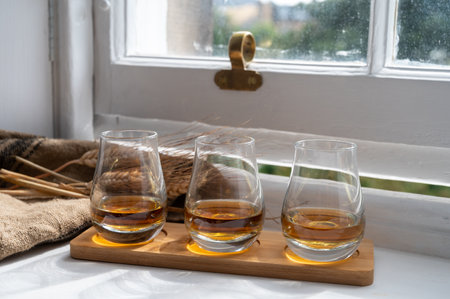Introduction to Rare Whisky Collecting
Steeped in tradition and wrapped in a sense of mystique, rare whisky collecting has emerged as one of the United Kingdom’s most fascinating pursuits for connoisseurs and investors alike. This exclusive world celebrates not only the liquid gold produced by time-honoured distilleries, but also the stories, heritage, and craftsmanship that flow through every bottle. Across Scotland, Northern Ireland, England, and Wales, whisky is much more than a drink; it is an emblem of cultural pride and regional identity, connecting enthusiasts to centuries-old customs and legendary distilling techniques. What draws collectors to this refined hobby is a blend of passion for history, appreciation for artistry, and the thrill of discovering bottles that tell tales from distant eras. Whether displayed in elegant decanters or preserved in their original casks, rare whiskies evoke a sense of wonder and exclusivity—making them prized possessions for those who seek both personal enjoyment and promising investment opportunities. In this guide, we will delve into the captivating journey from historic distilleries to coveted decanters, uncovering why rare whisky collecting continues to enchant new generations across the UK.
2. Navigating Distilleries: What Makes a Whisky ‘Rare’?
The allure of rare whisky lies in its scarcity, craftsmanship, and story. In the UK, distilleries are at the heart of this narrative, producing expressions that stand out globally. But what truly sets a whisky apart as rare? Discerning collectors look for characteristics such as limited editions, single malts from historic names, and bottles originating from now-closed distilleries—a phenomenon particularly resonant in Scotland’s whisky heritage.
Defining Rarity in Whisky
Not all whiskies are created equal. The rarity of a bottle can depend on several factors:
| Factor | Description |
|---|---|
| Single Malts | Produced from one distillery using malted barley; often unique in flavour and character. |
| Limited Editions | Bottled in small quantities, sometimes to commemorate anniversaries or special collaborations. |
| Closed Distilleries | Whiskies from distilleries that have ceased production, making existing stock finite and highly sought after. |
The Role of UK Distilleries
British distilleries—particularly those in Scotland—have an outsized influence on the rare whisky market. Names like Macallan, Glenfiddich, and Ardbeg are synonymous with innovation and tradition alike. Meanwhile, English and Welsh producers are gaining recognition for their boutique releases and experimental approaches, further enriching the collector’s landscape.
UK Distilleries on the Global Stage
The UK’s distilling prowess is not just about volume but also about setting trends. British whiskies frequently fetch record prices at auction houses from London to Hong Kong, reinforcing their status as both cultural icons and investment opportunities. This global demand underscores how UK distilleries drive the evolution of what collectors value in rare whisky today.
![]()
3. Building Your Collection: Sourcing and Selecting Bottles
When it comes to amassing a rare whisky collection, both newcomers and seasoned enthusiasts must master the art of sourcing and selecting bottles. The British whisky market, renowned for its heritage and transparency, offers several trusted avenues for acquiring prized drams. Among these, reputable auction houses such as Bonhams and Sotheby’s stand out for their regular whisky sales, offering collectors access to unique bottles with comprehensive provenance documentation. Equally valuable are specialist retailers like The Whisky Exchange and Master of Malt, whose curated selections ensure authenticity and quality. For those looking to secure the rarest releases, joining exclusive mailing lists or private members’ clubs can provide early access to limited editions straight from distilleries. Regardless of the route you take, always prioritise provenance—the bottle’s history of ownership and storage conditions—which directly impacts value and collectability. Rely on certificates of authenticity, original packaging, and detailed descriptions provided by sellers, especially in secondary markets. Engaging with local whisky societies or visiting UK-based whisky festivals can also be insightful, allowing collectors to network, share tips, and even spot emerging trends before they hit the mainstream. Remember: in Britain’s dynamic whisky scene, knowledge is as vital as opportunity—doing your due diligence ensures each addition to your collection is a smart investment as well as a source of personal pride.
4. Caring for Your Investment: Storage and Preservation
Once you’ve acquired rare whiskies, proper care is paramount to preserve both value and taste. British collectors are renowned for their meticulous approach, blending tradition with modern sensibility. Here’s how to ensure your liquid assets remain in peak condition.
Best Practices for Whisky Storage
The golden rule is consistency—whisky fares best away from extremes. Store bottles upright, as contact with the cork can degrade it over time, risking oxidation or leakage. A cool, dark space is ideal; traditional British homes often utilise cellars or shaded cupboards that maintain a steady temperature of 15–20°C (59–68°F).
| Storage Factor | Recommended Practice |
|---|---|
| Light Exposure | Avoid direct sunlight; UV rays can alter flavour and fade labels. |
| Temperature | Keep between 15–20°C; avoid rapid fluctuations. |
| Humidity | Maintain at 50–70% to protect cork integrity. |
| Bottle Position | Store upright to prevent cork degradation. |
The Role of Decanters in British Homes
Decanters have long been a mark of sophistication in British households, but they serve more than an aesthetic purpose. While decanting can enhance presentation, it’s crucial to use crystal or lead-free glass to avoid contamination. For rare whiskies, limit decanter use to short-term serving—prolonged storage may result in evaporation and subtle flavour loss due to less effective sealing compared to original bottles.
Traditional Storage Tips Passed Down Generations
- Avoid the Kitchen: High heat and moisture from cooking can damage whisky quality.
- No Attics or Lofts: These spaces are prone to seasonal temperature swings.
- Original Packaging: Retain boxes and tubes—they add value and offer protection from light.
- Label Care: Handle bottles with clean hands; oils can stain labels and reduce collectability.
Pitfalls to Avoid for UK Collectors
Common mistakes include displaying prized bottles on sunny shelves or near radiators—a tempting prospect, but detrimental in the long run. Another pitfall is overhandling, which can wear labels and packaging. Lastly, be wary of decanting prized single malts unless consumption is imminent; once exposed to air, flavours may subtly shift even within days.
Caring for your rare whisky collection is as much about honouring tradition as it is about smart investment. By following these established British practices, you’ll ensure your collection matures gracefully—ready for future enjoyment or profitable sale.
5. Understanding Value: Trends and Opportunities
The UK’s rare whisky market is a dynamic landscape, shaped by heritage, innovation, and shifting collector demand. As the scene evolves, discerning enthusiasts and investors alike are eager to identify which bottles might become tomorrow’s treasures. Understanding the factors that drive value and recognising emerging trends is key to capitalising on opportunities in this rewarding sector.
The Evolving UK Whisky Market
Britain’s whisky market has undergone a renaissance in recent years. While traditional Scotch remains the backbone, boutique distilleries and limited releases have fuelled renewed excitement among collectors. The rise of independent bottlers and experimental cask finishes adds diversity, while auction houses across London and Edinburgh regularly break records for rare lots. This constant innovation keeps the market lively and creates new avenues for growth.
Key Investment Trends
Several notable trends currently shape whisky collecting in the UK:
Limited Editions & Distillery Exclusives
Bottles released in small batches or exclusively at the distillery often see swift appreciation in value. Collectors covet inaugural releases from new distilleries and special cask finishes.
Age Statements & Provenance
Whiskies with significant age statements—especially those over 25 years—and clear provenance command premium prices, particularly from closed or iconic distilleries such as Port Ellen or Brora.
Packaging & Presentation
Impeccable packaging, unique decanters, and collaborations with renowned artists or designers can dramatically influence desirability and price.
Spotting Appreciating Bottles
The most sought-after bottles often share a few tell-tale attributes:
- Low production numbers or single cask origin
- Award-winning or critically acclaimed batches
- Historical significance or ties to milestone events
Keen collectors keep an eye on auction results, monitor specialist retailers, and engage with whisky tasting communities to stay ahead of the curve.
Unearthing Potential Gems
The secret to finding future stars lies in research and timing. Don’t overlook up-and-coming distilleries or overlooked regions—English whiskies, for example, are gaining serious traction. Attend tastings, speak with industry insiders, and consider subscribing to UK-based whisky publications for early insights into rising trends. Remember: today’s underdog could be tomorrow’s showstopper.
6. Showcasing Your Collection: Sharing and Social Etiquette
In Britain, sharing your rare whisky collection is as much about tradition and etiquette as it is about the spirit itself. Hosting a whisky tasting at home or joining collector gatherings across the UK offers a unique opportunity to celebrate both craftsmanship and camaraderie. When inviting guests to sample your prized bottles, it’s customary to provide a welcoming yet understated setting—think polished glassware, subtle lighting, and perhaps a curated playlist of jazz or classical British tunes. The golden rule? Never show off; instead, let each bottle’s story speak for itself.
Hosting with British Finesse
British hosts pride themselves on thoughtful preparation and attentive hospitality. Begin by greeting each guest personally and offering a selection of whiskies that reflects both variety and rarity. When pouring, always serve modest measures—appreciation comes in sips, not gulps. Food pairings should remain simple: oatcakes, mild cheeses, or dark chocolate help accentuate the dram without overpowering it. Above all, avoid overindulgence; moderation is key in British whisky circles.
The Art of Tasting Together
During tastings, encourage discussion but allow everyone to form their own impressions first. It’s considered good form to nose the whisky gently before taking a small sip, savouring the aroma and complexity. In collector circles from London to Edinburgh, debates about distilleries or cask finishes are lively yet respectful—disagreement is welcomed, provided it’s delivered with wit and good humour.
Engaging with Collector Communities
Across the UK, dedicated whisky clubs host regular meet-ups where enthusiasts share recent acquisitions or arrange bottle swaps. Joining these groups is an excellent way to expand your palate and build lasting friendships. Remember to RSVP promptly and contribute thoughtfully—bringing a rare or unusual bottle to share will be appreciated and remembered.
Social Media and Digital Decorum
If you showcase your collection online, particularly within British forums or social media groups, humility remains paramount. Focus on storytelling rather than boasting: share tasting notes, personal anecdotes from distillery visits, or insights on market trends. When commenting on others’ collections, offer encouragement and ask open-ended questions—never criticise someone’s preferences or choices.
The Spirit of Generosity
Ultimately, rare whisky collecting in Britain is rooted in generosity and shared experience. Whether hosting an intimate gathering at home or participating in grander events like The Whisky Show in London or regional festivals in Scotland, remember that true prestige lies not just in the value of your bottles but in the warmth with which you pour them for friends old and new.
7. Resources and Further Reading
Diving deeper into the world of rare whisky collecting requires more than just an impressive collection—it’s about staying informed, connected, and inspired by the broader whisky community. Here is a curated selection of British resources to help you expand your knowledge, build connections, and stay ahead of emerging trends in the market.
Essential Books for Collectors
- “Whisky: The Manual” by Dave Broom – A practical guide with a British perspective on enjoying whisky in all its forms.
- “Scotch Whisky: A Complete Guide” by Charles MacLean – An authoritative tome detailing Scotland’s distilleries and the nuances behind collectable expressions.
- “Malt Whisky Companion” by Michael Jackson – Widely considered essential reading for both new and seasoned collectors.
Societies & Networking Groups
- The Scotch Malt Whisky Society (SMWS) – Based in Edinburgh, SMWS offers exclusive bottlings, tastings, and a vibrant members’ community.
- The Worshipful Company of Distillers – One of London’s historic livery companies, fostering education and networking among spirits professionals and enthusiasts alike.
Online Forums & Digital Communities
- Whisky Magazine Forum UK – An active platform for discussing new releases, investment trends, and tasting notes with fellow British collectors.
- Reddit’s r/Scotch – While global, this subreddit features robust participation from UK-based enthusiasts, sharing insights on auctions and rare finds.
Annual Events Worth Attending
- The Whisky Show (London) – Britain’s premier whisky event featuring masterclasses, rare tastings, and networking with industry leaders.
- The Islay Festival of Music and Malt (Fèis Ìle) – A pilgrimage for any serious collector, blending culture, music, and legendary distillery tours.
Keeping Up with the Market
For ongoing updates on auction results, market analysis, and new bottle releases, consider subscribing to publications like The Spirits Business, Whisky Auctioneer News, or tuning into podcasts such as The Whisky Lounge Podcast. Staying plugged into these resources ensures you remain at the forefront of rare whisky collecting in Britain—where tradition meets innovation and every dram tells a story.


